Transcription of Summary of the CQC Improvement Plan - nsft.nhs.uk
1 1 Summary of the CQC Improvement plan Version 14 Nov 2017 Board assessment that action is on track to deliver outcome Key: Delivered On track to deliver Some issues narrative disclosure Not on track to deliver 2 Norfolk and Suffolk NHS Foundation Trust our Improvement plan and our progress What are we doing? The Trust was rated as Inadequate and placed into special measures following an inspection by the Chief Inspector of Hospitals (CQC) in July 2017. The Chief Inspector made 25 recommendations in total, 21 of which the Trust must undertake and 4 of which the Trust should undertake. All 25 recommendations are included in our CQC Improvement plan . The key themes of these recommendations are summarised below: Improving safety Improving staffing Improving service access / capacity Improving data / performance (Quality) Improving compliance The plan is iterative and will include a governance review to be commissioned by NHS Improvement which will add to the Improvement learning.
2 The Trust Board has approved the CQC Improvement plan which has been designed to deliver the immediate actions required as well as the longer term improvements needed. Support and engagement of our staff and our stakeholders will be fundamental to making the sustainable changes that are required for the benefit of everyone who uses our services. A robust system of governance has been established to track and deliver the progress against the plan . The plans have been developed on a service line basis to match the approach taken by the CQC. Service Line Leads have been appointed to implement the plans and Operational Leads have been allocated to ensure actions are implemented quickly and effectively and to unblock any obstacles that might prevent completion of the actions. There is Executive and Non-Executive oversight against all service lines plans and further independent review will be provided through a clinically-led Peer Review and Audit process.
3 Performance will be monitored through our Quality Programme Board and reported to the Quality Governance Committee and to the Trust Board. Further oversight will be provided to our stakeholders through a monthly Oversight and Assurance meeting. The Improvement plan will be monitored by the Quality Programme Board on a weekly basis, with each service line being reviewed on a fortnightly basis. This document shows our plan for making these improvements and will demonstrate our progression against the plan . The CQC Improvement plan was signed off by the Board on 13 November 2017. The plan ensures that the format and content align to the CQC reporting domains and that there is further clarity of the intended outcomes and key performance indicators across the programme of Improvement . This will assist in the process to ensure that Improvement actions align with the Improvement recommendations.
4 3 Who is responsible? Our actions to address the recommendations have been agreed by the Trust Board. Our Chief Executive, Julie Cave, is ultimately responsible for implementing actions in this document. Other executive directors are responsible for ensuring the plan is implemented as they provide the executive leadership for quality, patient safety and workforce: Debbie White (Director of Ops Norfolk & Waveney), Pete Devlin (Director of Ops Suffolk), Dawn Collins (Director of Nursing), Bohdan Solomka (Medical Director), Daryl Chapman (Director of Finance). Mark Gammage is the external advisor to the Board on HR/OD issues. Non-executive directors are responsible for testing and challenging the executive on the robustness of the plan , triangulating board reports with experience of front line staff and service users & carers.
5 Philippa Slinger has been appointed as our Improvement Director and she will support our progress by challenging our approach to ensure we deliver the most effective service to our patients. The Improvement Director acts on behalf of NHS Improvement and works with the Trust to ensure delivery of the improvements and to oversee the implementation of the action plan . Ultimately, our success in implementing the recommendations of the CQC Improvement plan will be assessed by the Chief Inspector of Hospitals, who will re-inspect our Trust in 2018. If you have any questions about the work we are doing you may contact our Head of Governance, Sue Barrett, The format of this This Summary document begins with the longer term changes that we need to make. We recognise that sustainable Improvement requires cultural changes which will take longer than our immediate action plans.
6 We need to build a culture that empowers colleagues, that instills ownership and accountability for quality and which ensures that we deliver our promises. We have called these long term themes our systemic issues and they focus on leadership and medical and staff engagement. The pages that follow the systemic issues cover our required actions. These are our immediate responses to the Chief Inspector s 25 must dos and should dos . Although we have shown these on a calendar going up to April 2018 this does not mean that our work will stop in April. There will be more work to do on some actions and where we have made changes we will continue to check that the improvements have been sustained. This is a Summary document and behind each of the actions there are detailed service line plans that are not shown here. These include milestones to measure progress and the names of individuals who are accountable for delivering the improvements.
7 We have rated the actions as green at this stage in our planning. This is because we believe that the plan is realistic and is on track. We recognise that as time goes on, some actions may not go to plan and if this happens they will then change to amber which means that there are reasons to be concerned that the action will not deliver the outcome or timescale or red if we now believe that the action is not on track to deliver. There are some actions where important aspects are not under our control and so we have used amber to show that we have less certainty. The amber and red ratings make sure that we focus our attention on the important actions to get them back on track. 4 How we will communicate our progress to you? We will provide a progress report every month, which will be monitored by the Quality Programme Board and reviewed by the Trust Board.
8 The progress report will be published on the Trust website, and subsequent longer term actions may be included as part of a continuous process of Improvement . Each month we will let all staff, governors and stakeholders know our progress. We will write to all FT members via our newsletters letting them know more about the inspection outcome and describing the Improvement plan , where members can access the action plan and how and when we will update it. We will present updates on progress at our scheduled Council of Governor meetings which are held in public. We will provide staff with an update on progress at our monthly broadcasts and communications to staff. We will provide updates to our stakeholders through the oversight and assurance meetings which will be held on a monthly basis. Chair / Chief Executive Approval (on behalf of the Board): Chair Name: Gary Page Signature: Date: Chief Executive Name: Julie Cave Signature: Date: 5 OUR Improvement plan - SYSTEMIC ISSUES Leadership Leadership is a core theme to our Improvement .
9 It shapes our culture, promotes engagement and creates an environment open to learning and quality Improvement . Whilst some work has started on building emotional intelligence we need to ensure our staff are equipped with the right skills to lead their teams in delivering excellent care to our service users. To do this we need to engage everyone in the organisation so that we have compassionate, inclusive and effective leaders at all levels. To do this we must: Agree what good leadership looks like at different levels to include knowledge, skills, attitudes and behaviours. Ensure that our staff receive appropriate skills development, including feedback and support. Ensure a system is in place to recognize talent and to attract, identify and develop people with good leadership potential. We will work with East London NHS Foundation Trust to develop some aspects of this core theme, learning from their approach to leadership.
10 Another important feature of our work will be as part of the Norfolk and Waveney and the Suffolk and North East Essex Sustainability and Transformation Plans This work will focus on the long term sustainability of the health systems across our counties. Summary of key actions Oct Nov Dec Jan Feb Mar Apr & beyond Strategic actions Trust Board to review exec roles and ensure appropriate structure is in place Trust Board to develop a revised Organisational Development Strategy and agree an implementation plan Trust Board agree and adopt Improvement methodology to drive forward a high quality, high performing organisation based on continuous Improvement Exec Team to adopt the Developing People Improving Care Framework Trust Board to participate in and develop the Leadership for Improvement programme Exec Team to agree and develop leadership programmes for all levels CEO to introduce a coaching for performance scheme for managers Operational actions Exec Team to communicate clear plans for addressing CQC issues and progress Visibility of the Board (Execs and NEDS) to include the CEO monthly broadcast, weekly/monthly planned visits to each area, partnered up with corporate heads HR lead to introduce a team briefing process 6 Chair to lead on substantive appointments to Board vacancies (inc recruitment process)




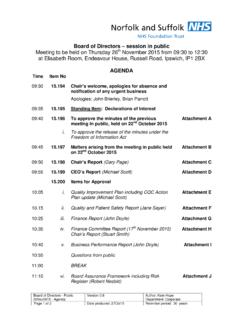



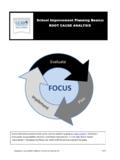
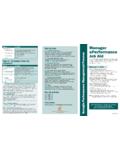
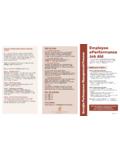

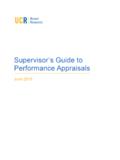
![Writing Your QAPI Plan [Read-Only] - LeadingAge …](/cache/preview/b/9/9/8/2/3/f/a/thumb-b99823fa2ae9636b8ed3230c56f78051.jpg)
